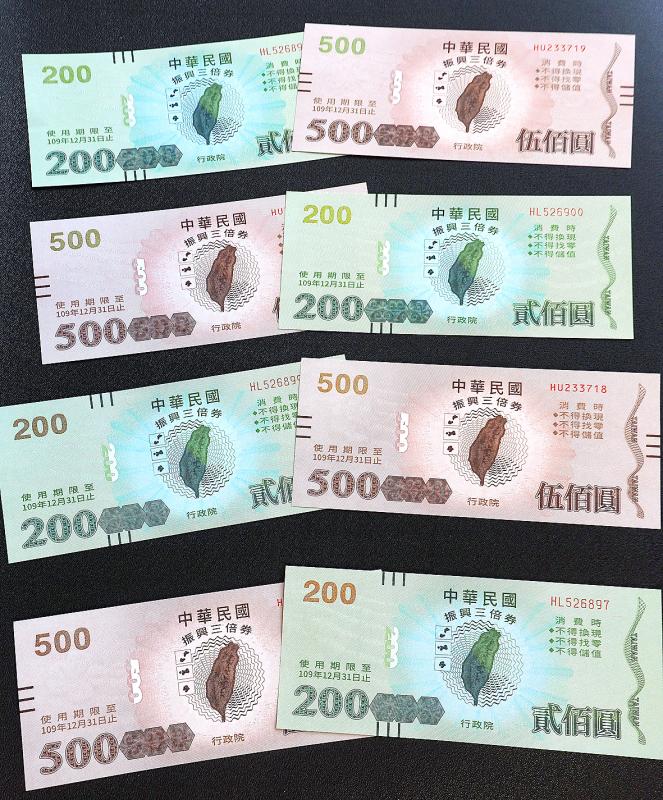A stimulus voucher program and coupon packages introduced by the Executive Yuan and other government agencies to bolster the economy have nearly tripled business revenue, the Ministry of Economic Affairs said yesterday.
Ministry officials presented the figures in a report to Premier Su Tseng-chang (蘇貞昌) at a weekly meeting of the Executive Yuan.
Su was told that the NT$65.055 billion (US$2.25 billion) spent for the Executive Yuan to issue the Triple Stimulus Vouchers and for agencies to issue coupons generated an estimated NT$179 billion in business revenue, boosting the economy amid the COVID-19 pandemic.

Photo: David Chang, EPA-EFE
The Ministry of Transportation and Communications, the Council of Agriculture, the Sports Administration, the Ministry of Culture and the Hakka Affairs Council issued their own coupons.
To boost consumer spending, people were encouraged to buy NT$3,000 of vouchers for NT$1,000.
Regardless of age or income level, all 23 million Taiwanese, as well as 150,000 foreign and Chinese spouses holding residency permits, were eligible to purchase paper or electronic vouchers.
As of Tuesday, 22.89 million people had bought the vouchers, or 96 percent of those eligible, Small and Medium Enterprise Administration Director-General Ho Chin-tsang (何晉滄) told reporters after the meeting.
About 21.09 million people selected the paper stimulus vouchers, while 1.8 million chose electronic vouchers, with only 910,000 people still needing to collect their stimulus vouchers, Ho said.
The buying spree triggered by the vouchers has been reflected in business revenue and government tax income, as seen by the growth in July retail sales, ending a five-month contraction, he said.
Taiwan’s retail sales in August and last month set historical single-month highs, as did the restaurant and beverage sector last month, Ho added.

Sweeping policy changes under US Secretary of Health and Human Services Robert F. Kennedy Jr are having a chilling effect on vaccine makers as anti-vaccine rhetoric has turned into concrete changes in inoculation schedules and recommendations, investors and executives said. The administration of US President Donald Trump has in the past year upended vaccine recommendations, with the country last month ending its longstanding guidance that all children receive inoculations against flu, hepatitis A and other diseases. The unprecedented changes have led to diminished vaccine usage, hurt the investment case for some biotechs, and created a drag that would likely dent revenues and

Global semiconductor stocks advanced yesterday, as comments by Nvidia Corp chief executive officer Jensen Huang (黃仁勳) at Davos, Switzerland, helped reinforce investor enthusiasm for artificial intelligence (AI). Samsung Electronics Co gained as much as 5 percent to an all-time high, helping drive South Korea’s benchmark KOSPI above 5,000 for the first time. That came after the Philadelphia Semiconductor Index rose more than 3 percent to a fresh record on Wednesday, with a boost from Nvidia. The gains came amid broad risk-on trade after US President Donald Trump withdrew his threat of tariffs on some European nations over backing for Greenland. Huang further

CULPRITS: Factors that affected the slip included falling global crude oil prices, wait-and-see consumer attitudes due to US tariffs and a different Lunar New Year holiday schedule Taiwan’s retail sales ended a nine-year growth streak last year, slipping 0.2 percent from a year earlier as uncertainty over US tariff policies affected demand for durable goods, data released on Friday by the Ministry of Economic Affairs showed. Last year’s retail sales totaled NT$4.84 trillion (US$153.27 billion), down about NT$9.5 billion, or 0.2 percent, from 2024. Despite the decline, the figure was still the second-highest annual sales total on record. Ministry statistics department deputy head Chen Yu-fang (陳玉芳) said sales of cars, motorcycles and related products, which accounted for 17.4 percent of total retail rales last year, fell NT$68.1 billion, or

MediaTek Inc (聯發科) shares yesterday notched their best two-day rally on record, as investors flock to the Taiwanese chip designer on excitement over its tie-up with Google. The Taipei-listed stock jumped 8.59 percent, capping a two-session surge of 19 percent and closing at a fresh all-time high of NT$1,770. That extended a two-month rally on growing awareness of MediaTek’s work on Google’s tensor processing units (TPUs), which are chips used in artificial intelligence (AI) applications. It also highlights how fund managers faced with single-stock limits on their holding of market titan Taiwan Semiconductor Manufacturing Co (TSMC, 台積電) are diversifying into other AI-related firms.